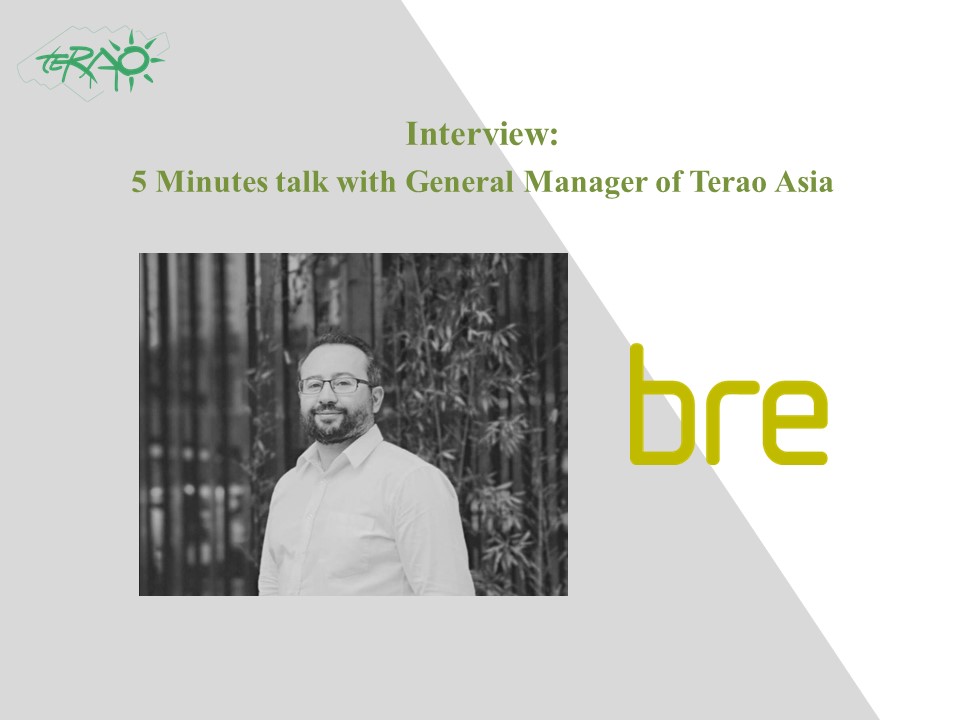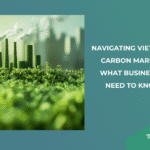Last week, TERAO Asia General Manager, Manuel Ramos, had the pleasure to be interviewed by BRE China. During the interview, Manuel has shared with us his views about the trends in building industry after COVID-19 as well as the benefits of BREEAM for green building projects.
Q1: It is our great pleasure to have Manuel Ramos, General Manager of Terao Asia to be our interviewee today. Hi Manuel, pleasure to see you. Could you briefly describe Terao’s business in general?
Manuel:
Terao is a building sustainability consultancy that mostly focuses on energy efficiency, carbon footprint, and as well all kinds of comfort within buildings such as thermal comfort or lighting comfort. We focus on the built environment, which means building scales but also at the level of districts and also for fit-out spaces.
Q2: So among all those BREEAM projects you have successfully done in China, which one was your favorite project and why?
Manuel:
So first we have a preferred client, I will say that we like a lot which is IKEA. This client has been asking for support since 2016. So we have them to implement a few projects. For sure one of my favorite one is the first one we did for them that we certified in Guangzhou, the Panyu Project. And also as well we had the first IRFO project with them, the IKEA Component Co., Ltd. in Nantong.
Q3: What do you think are the benefits of BREEAM to this project? For example, IKEA Nantong?
Manuel:
I would like to say first about BREEAM itself. We are quite knowledgeable about this concept because we have been doing it in Europe before coming to China, and we think that in Europe it’s quite successful, and is getting more successful in China, because we believe it’s a more comprehensive type of standard. So it means that it covers more criteria than most other green building standards in the market. Not only on the energy of building performance, but also a lot of topics related to wellbeing and comforts. So in the component activity of IKEA, for example, we work on the acoustic comfort within some specific area of the factory.
Q4: Green building schemes have been in the market for many years as you have, to your insights and your conversation with clients, any trends or new indicators (ESG, IAQ, etc.) that you think would best catch the attention of the built environment sustainability industry?
Manuel:
I think until recently these schemes or users were mostly focusing on building performance when they were thinking about green building, so the energy criterion was the major criterion they were looking at. But more recently in the last two or three years, not only because of the recent situation we’ve seen, we see more interest about well-being and comforts. For example, IAQ, because there are a lot of now expectations from the occupants of the building. So a lot of companies want to work on these aspects for retention proposes so they want to keep their employees satisfied, they want to keep them within their companies. That’s one trend. So we see more interest in IAQ, acoustic comfort, lighting comfort, and so on.
And then another trend is anything related to the carbon footprint. So most companies now start to have targets related to the carbon footprint, applied to build environment will also apply to other aspects. So we see more and more clients are asking us to work specifically on the reduction of their carbon footprint. So that’s another big trend.
Q5: What changes do you see to be taking place after the COVID-19 pandemic? Will it affect people’s behavior and way of thinking, especially for this industry?
Manuel:
As I said before, there will be an even more focus on everything relating to indoor air quality so related to ventilation strategies I’ll say. And everything related to the renewal of air. Also the working space might change a bit more, the distancing within the working space, the way people communicate through different tools. Maybe less face-to-face meetings, and more online communications. Transportation will change. I think there will be more transportation which is not related to public transportation. So the employers who would pursue your employees to use bicycles, and they would put the right facilities on site to make it happen. So I think there will be a chance as well for this kind of aspect.
Original article from BRE China WeChat account.
TERAO has the expertise to certify your sustainable building under BREEAM certification. For more information, do not hesitate to contact us at contact@teraochina.cn.




Leave A Comment